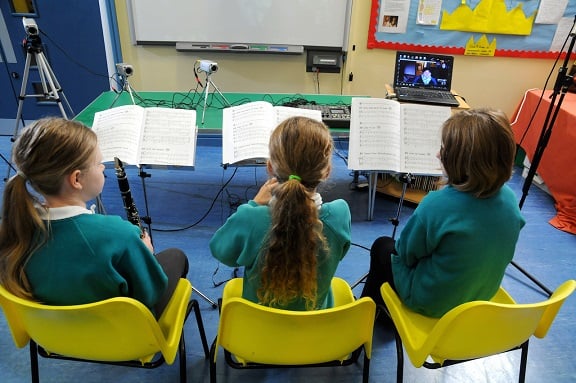
Online music lessons an effective way of reaching rural pupils
Music Hubs could save an average of 476 hours driving a week by switching to online teaching, research suggests.
Online music tuition can be a cost-effective and practical way of reaching young people in schools in rural areas, providing broadband is fast enough, a new report has found.
It also suggests that Music Education Hubs could save an average of 476 hours a week on the road by switching to virtual lessons.
“Music Education Hubs serving areas with a large rural population are hindered by cost, transport and logistical barriers. By incorporating the Connect: Resound model of virtual tuition into the weekly schedule, teachers could spend less time travelling and more time teaching,” Heidi Johnson, director of NYMAZ, said.
Remote teaching
NYMAZ’s Connect: Resound, a collaboration with UCan Play, the University of Hull and numerous Music Education Hubs, was rolled out to four areas across England after a successful pilot in North Yorkshire in 2014/15.
Students in the project are taught to play an instrument using Skype software, augmented with additional audio-visual equipment. Alongside discovering how digital technology can enable better and broader access to music education, the project also provides “enrichment opportunities” for schools to tune into live broadcasts of music performances from organisations such as the Hallé Orchestra.
Reaction to the lessons
The report found concentration and behaviour in virtual lessons was generally good, but improved when an adult such as a teaching assistant was present.
Parents and pupils were found to be positive about the lessons, and sound and connection were reported to be good or very good for the majority of the time.
For teachers, the lessons required greater preparation, precision, and flexibility than traditional tuition. It was reported to be important to use less of a stop-start approach, to avoid interrupting the different flow of the lesson, and new methods for teaching students to play in time had to be developed as the teacher and student could not play simultaneously.
Challenges
Despite the programme’s popularity, the report cautions that virtual tuition and young people’s access to equal opportunities is severely limited by poor broadband in rural areas.
In addition, Music Education Hubs’ transition to online teaching is highlighted as a challenge, as teachers have to be trained, IT systems have to be set up, and time has to be spent integrating the lessons into the overall timetable.
Other issues include the compatibility of technology with available software and the video conferencing that local authority networks are set up to use.
In the future, the report suggests research into teaching larger groups, teaching in multiple locations and teaching pupils in settings with less access to instrumental learning.
Speaking about the report, David Inman, Director of Rural Services Network, said: “The Rural Services Network feels that broadband is both a massive opportunity and a potential serious divide for rural areas.
“Strong future-proofed telecommunication and broadband links are essential for ground-breaking innovations to become a reality. The alternative is that we risk remote areas becoming ‘not spots’: what hope does that give our young people? We feel strong connectivity for all is vital.”
Join the Discussion
You must be logged in to post a comment.